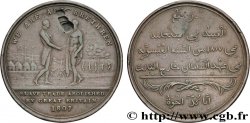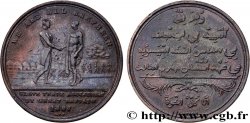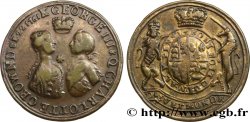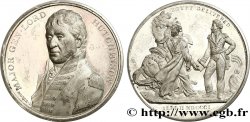fme_485128 - GREAT-BRITAIN - GEORGE III Médaille pour la libération égyptienne, Général John Hely-Hutchinson
Not available.
Item sold on our e-shop (2019)
Price : 250.00 €
Item sold on our e-shop (2019)
Price : 250.00 €
Type : Médaille pour la libération égyptienne, Général John Hely-Hutchinson
Date: 1801
Mint name / Town : Angleterre
Metal : tin
Diameter : 40,5 mm
Orientation dies : 12 h.
Weight : 33,56 g.
Edge : Lisse
Puncheon : sans poinçon
Coments on the condition:
Traces de manipulation et frottement dans les champs. Quelques taches sur les motifs. Peu d’usure dans l’ensemble
Catalogue references :
Obverse
Obverse legend : MAJOR GEN. LORD - HUTCHINSON.
Obverse description : Buste du major à gauche; signé : MUDIE. D et WEBB. F..
Reverse
Reverse legend : EGYPT DELIVERED, À L’EXERGUE : SEPT II MDCCCI.
Reverse description : Le major à droit tenant le traité de paix dans sa main droite, le tendant à un chef de clan (Bey) égyptien tenant son cheval de sa main gauche. A l’arrière plan, un bateau à droite et une pyramide à gauche ; signé : DUPRES. F et MUDIE. D.
Reverse translation : Egypte délivré.
Commentary
D’après l’ouvrage de L. Forrer, cette médaille fait partie d’une série “Médailles Nationales” commémorant les victoires anglaises sur la France sous le règne de Georges III, émise par James Mudie. Elle présente de nombreuses personnalités et différents artistes y contribuent. Sur cet exemplaire, on retrouve les noms des artistes Thomas Webb (1748-1827) et Augustin Dupré (1748-1833).
Lord Hutchinson ou General John Hely-Hutchinson, 2e comte de Donoughmore (1757-1832) est un soldat, pair et politicien anglo-irlandais. Il était second en commandant pendant l’expédition d’Egypte de 1801, sous les ordres de Abercromby. Après la mort de ce dernier pendant la bataille d’Alexandrie en mars 1801, Hely-Hutchinson prit le commandement. Suite à quoi, il prit les villes du Caire et d’Alexandrie aux français, ce qui lui valut d’être décoré par le sultan Selim III et de recevoir certains avantages en Angleterre.
According to L. Forrer, this medal is part of a series of “National Medals” commemorating English victories over France during the reign of George III, issued by James Mudie. It features numerous personalities and various artists contributed to it. On this example, we find the names of the artists Thomas Webb (1748-1827) and Augustin Dupré (1748-1833). Lord Hutchinson or General John Hely-Hutchinson, 2nd Earl of Donoughmore (1757-1832) was an Anglo-Irish soldier, peer, and politician. He was second in command during the Egyptian expedition of 1801, under Abercromby. After the latter's death during the Battle of Alexandria in March 1801, Hely-Hutchinson took command. Following this, he took the cities of Cairo and Alexandria from the French, which earned him a decoration from Sultan Selim III and certain benefits in England.
Lord Hutchinson ou General John Hely-Hutchinson, 2e comte de Donoughmore (1757-1832) est un soldat, pair et politicien anglo-irlandais. Il était second en commandant pendant l’expédition d’Egypte de 1801, sous les ordres de Abercromby. Après la mort de ce dernier pendant la bataille d’Alexandrie en mars 1801, Hely-Hutchinson prit le commandement. Suite à quoi, il prit les villes du Caire et d’Alexandrie aux français, ce qui lui valut d’être décoré par le sultan Selim III et de recevoir certains avantages en Angleterre.
According to L. Forrer, this medal is part of a series of “National Medals” commemorating English victories over France during the reign of George III, issued by James Mudie. It features numerous personalities and various artists contributed to it. On this example, we find the names of the artists Thomas Webb (1748-1827) and Augustin Dupré (1748-1833). Lord Hutchinson or General John Hely-Hutchinson, 2nd Earl of Donoughmore (1757-1832) was an Anglo-Irish soldier, peer, and politician. He was second in command during the Egyptian expedition of 1801, under Abercromby. After the latter's death during the Battle of Alexandria in March 1801, Hely-Hutchinson took command. Following this, he took the cities of Cairo and Alexandria from the French, which earned him a decoration from Sultan Selim III and certain benefits in England.








 Report a mistake
Report a mistake Print the page
Print the page Share my selection
Share my selection Ask a question
Ask a question Consign / sell
Consign / sell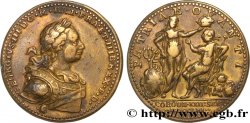
 Full data
Full data
